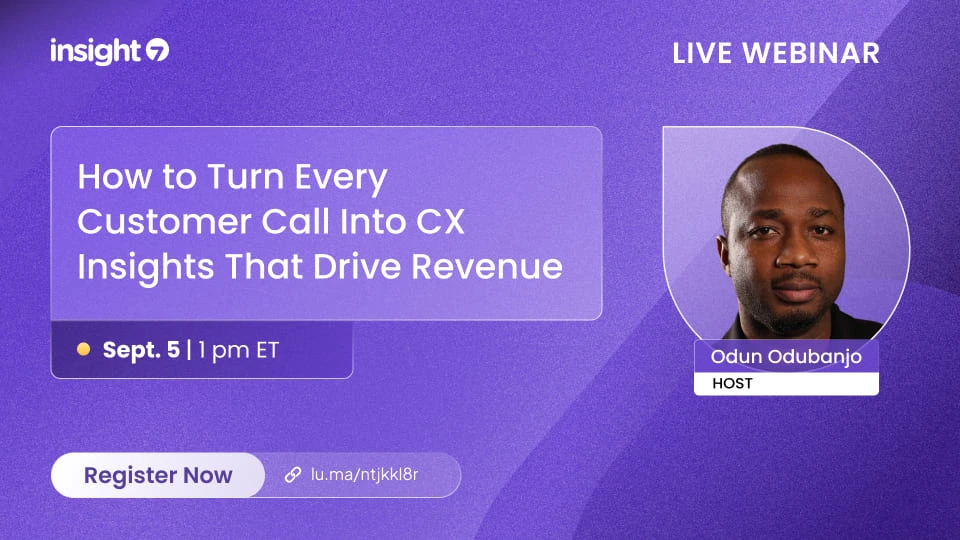7 Best Online Research Tools
-
Bella Williams
- 10 min read
Effective online research is crucial in our information-rich world. With countless resources available, finding the right online research tools can significantly enhance your inquiry and analysis. Whether you’re gathering data for academic purposes or making business decisions, the right tools streamline your workflow and save valuable time.
This introduction highlights the top research tools that can empower your research efforts. From data organization to citation management, these resources facilitate an in-depth understanding of your subject matter. By leveraging these top tools, you can unlock insights, improve your productivity, and elevate the quality of your findings.
Analyze & Evaluate Calls. At Scale.

Finding the Right Online Research Tools: Top Research Tools to Enhance Your Search
Finding the right online research tools can significantly enhance your search experience. By choosing effective platforms, you can access high-quality information with ease. Each tool is designed to serve specific research needs, making it essential to understand their unique features. The top research tools can streamline your workflow and provide valuable insights into various topics, saving you precious time.
Among these essential tools, Google Scholar stands out for academic articles, while Zotero and Mendeley assist in managing references effectively. For those needing more advanced functionalities, EndNote offers robust features tailored for academic writing. Choosing the right combination of these resources will allow you to conduct thorough research, ensuring you gather and analyze information efficiently. As you navigate your online search, consider these top research tools to enhance your overall productivity.
Insight7: An Overview
The realm of online research tools offers a vast landscape for those seeking to enhance their data analysis capabilities. In this overview, we delve into the top research tools that provide vital support in managing and interpreting research data effectively. As organizations strive for efficiency, leveraging these tools can significantly streamline processes, enabling quicker access to insights.
Understanding the challenges researchers face, such as disorganization and slow analysis, is crucial. These top research tools are designed to address these issues, helping users organize references, analyze data, and collaborate more effectively. By integrating these tools into your research workflow, you can ultimately transform raw data into actionable insights. Exploring these innovations will empower you to stay ahead in your field and ensure your research is not only effective but also impactful.
Other Essential Tools
To conduct thorough online research, incorporating other essential tools can greatly enhance your findings. Among these, Google Scholar stands out as a premier resource for accessing scholarly articles, theses, and conference papers. This platform connects you to credible sources, facilitating a deeper understanding of your subject matter.
Zotero and Mendeley serve as excellent reference management software, allowing you to collect, manage, and cite your sources effortlessly. These tools simplify the organization of your research materials, ensuring you maintain clarity and focus throughout your project. EndNote, on the other hand, offers advanced features for managing bibliographies and references, making it a valuable asset for more extensive research endeavors.
By utilizing these top research tools, you can transform your research process into a more efficient and productive experience, ultimately leading to better insights and conclusions. Each tool has its unique strengths, ensuring that researchers across various disciplines have the right resources to achieve their goals.
Google Scholar
Google Scholar serves as a pivotal resource for anyone engaging in academic research. It functions as an extensive search engine that indexes an array of scholarly literature, including articles, theses, books, and conference papers. With its user-friendly interface, researchers can easily locate credible sources related to their topics of interest.
This powerful tool enables users to filter search results by publication date, relevance, and citation count, making it invaluable for finding high-quality content. Additionally, Google Scholar provides citation metrics for numerous articles, allowing scholars to gauge the impact and relevance of their sources. As a result, it emerges as one of the top research tools essential for students, academics, and professionals aiming to enhance their research capabilities. Accessing such a vast database not only saves time but also enriches the research process, ensuring that users can produce comprehensive and well-supported work.
Zotero
Zotero is a powerful tool that stands out among the top research tools available today. It serves as a free reference manager that simplifies the process of collecting, organizing, and citing sources. Users can effortlessly collect citations from various sources such as library catalogs, websites, and databases, allowing for seamless integration into your research projects.
This tool also offers users a robust organizational system that can categorize references into specific folders or tags. Additionally, you can create project-based groups where collaborators can share resources. This collaborative aspect makes Zotero ideal for both solo researchers and teams. By using Zotero, you can focus more on analysis and conclusions, rather than getting bogged down in the details of citation management. With its intuitive design, Zotero remains a top choice for those aiming to streamline their research process.
Mendeley
This tool stands out among the top research tools due to its robust features that streamline the research process. Users can build a personal library to manage their references and easily access a wide range of academic articles. The ability to annotate and highlight key points is crucial, allowing researchers to engage deeply with the material. This library system ensures that valuable information is always at your fingertips.
Moreover, collaborative projects transform how research teams work together. Users can create shared folders, making it simple to organize data and track progress collectively. The tool also offers integration options with other applications, enhancing its versatility for different research workflows. Automated citations and reference lists further simplify the documentation process, reducing the likelihood of errors. Overall, this tool remains essential for anyone looking to enhance their research efficiency and organization.
EndNote
The EndNote tool is a powerful resource for researchers looking to streamline their citation management process. With EndNote, users can easily collect, organize, and cite sources in various formats, ensuring proper attribution in their work. This tool is designed to simplify the complexity of managing bibliographies, allowing researchers to focus more on their studies rather than formatting references.
Additionally, EndNote integrates seamlessly with word processors, providing users with convenient citation capabilities. It enhances collaboration among peers by enabling shared libraries and annotations. This feature proves beneficial for collaborative projects, making it easier to access and discuss important research materials. Overall, EndNote stands out as one of the top research tools due to its robust features that cater to the diverse needs of researchers across various fields. In the realm of online research, harnessing such tools greatly enhances productivity and accuracy in scholarly work.
Extract insights from interviews, calls, surveys and reviews for insights in minutes
How to Use These Top Research Tools Effectively
To use the top research tools effectively, start by setting clear objectives for your research. Knowing what information you need will guide you toward the right tools and features. For instance, when utilizing Insight7, create projects that encompass your various data sources, making it easier to analyze and compare relevant information all in one place.
Next, ensure that you take advantage of the organizational features available in these tools. For example, tools like Zotero and Mendeley allow you to categorize references and manage your sources efficiently. This organization streamlines your workflow, enabling you to focus on analysis rather than sorting through endless files. Lastly, regularly revisit your findings to uncover patterns and insights, enhancing the overall effectiveness of your research endeavors. By following these strategies, you can optimize your use of the top research tools and dramatically improve your research experience.
Step-by-Step Guide to Insight7
To navigate the platform effectively, start by accessing the main dashboard. Here, you’ll find an intuitive interface that allows anyone in your organization to begin working right away, regardless of technical expertise. Once you’re logged in, you can upload your files or recordings and initiate the analysis process. You’ll quickly see how simple it is to generate insights without needing extensive training.
Next, explore the library feature where all uploaded content resides. This is where you can visualize conversations, extract pain points, and identify customer desires effortlessly. The system automatically generates insight cards that highlight critical themes from your discussions, accompanied by supporting evidence, ensuring that every analysis session is data-driven. By following these straightforward steps, you can unlock valuable insights that enhance your research capabilities, further establishing this platform as one of the top research tools available for effective online research.
Maximizing Efficiency with Other Tools
To maximize efficiency with other tools, it's essential to integrate complementary resources alongside the top research tools. Collaboration can greatly improve the research experience, making it more seamless and productive. First, consider organizing references. Utilizing tools like Zotero or Mendeley helps keep all your cited sources in one place. This streamlines the referencing process and saves precious time when preparing reports or presentations.
Secondly, analyzing data can significantly enhance your insights. Employ specialized software like SPSS or NVivo to dissect research findings and patterns effectively. These tools facilitate deeper understanding by visualizing data through charts and graphs, making complex information accessible. Embracing a combination of primary research tools and these supplementary resources will bolster your research efforts. Ultimately, this approach will lead to more impactful results and informed decisions in your projects.
Organizing References
Organizing references is a crucial aspect of any research process. For anyone utilizing the Top Research Tools available, proper organization can significantly enhance the clarity and efficiency of your findings. Start by selecting tools that allow you to categorize and retrieve references easily, streamlining your workflow.
One effective method is to create a systematic folder structure where categories align with your research topics. This allows for quick access to relevant studies, articles, and data sources. Additionally, using citation management software, such as Zotero or Mendeley, can facilitate automatic organizing of references, making it easier to format your citations and bibliographies accurately. Regularly reviewing and updating your reference list helps maintain its relevance and accuracy. Furthermore, integrating collaborative tools can enhance teamwork, enabling multiple contributors to access and manage shared references efficiently. By organizing your references thoughtfully, you'll enhance your research productivity and ensure a smoother writing process.
Analyzing Data
Analyzing data is a crucial step in the research process, enabling researchers to create meaningful insights from their findings. Start by organizing the data you gather, as structured information is easier to analyze. Utilize visualization tools and techniques to identify trends and patterns in the data, which can enhance your understanding. Creating graphs or charts can help to illustrate your points clearly while making the findings engaging for your audience.
Next, apply analytical methods to draw conclusions from the data. Techniques like sentiment analysis can help differentiate between positive and negative feedback, guiding decision-making processes. The aim is to uncover actionable insights from the data, which can then inform your next steps effectively. Ultimately, mastering these techniques will empower you to maximize the potential of the top research tools at your disposal, leading to more impactful results in your research endeavors.
Conclusion: Boost Your Productivity with the Best Top Research Tools
Utilizing the best top research tools can significantly enhance your productivity, helping you streamline your research process. Effective tools reduce the time spent searching for information, allowing you to focus on analyzing and applying insights. From organizing references to conducting in-depth analysis, these tools empower you to work smarter, not harder.
By integrating these online resources into your workflow, you can transform the way you carry out research. Embrace these efficiency-boosting strategies to elevate your work quality and achieve better results with less effort. Ultimately, mastering the use of top research tools is key to unlocking your full potential in today’s fast-paced environment.







